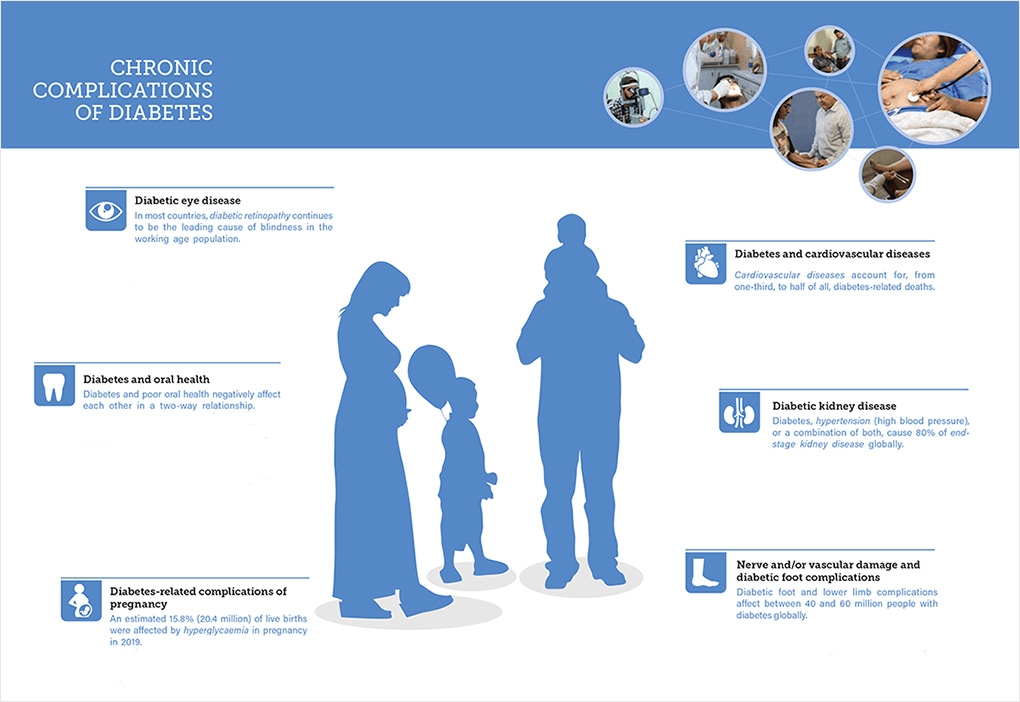- About Diabetes
- Premium Courses
- Free Courses
- Resource library
- GHU Training
- Login
- Register
People with diabetes have an increased risk of developing a number of serious health problems. Consistently high blood glucose levels can lead to serious diseases affecting the heart and blood vessels, eyes, kidneys, nerves and teeth. In addition, people with diabetes also have a higher risk of developing infections. In almost all high-income countries, diabetes is a leading cause of cardiovascular disease, blindness, kidney failure, and lower limb amputation.
Maintaining blood glucose levels, blood pressure, and cholesterol at or close to normal can help delay or prevent diabetes complications. Therefore people with diabetes need regular monitoring.

Cardiovascular disease: affects the heart and blood vessels and may cause fatal complications such as coronary artery disease (leading to heart attack) and stroke. Cardiovascular disease is the most common cause of death in people with diabetes. High blood pressure, high cholesterol, high blood glucose and other risk factors contribute to increasing the risk of cardiovascular complications. Learn more about diabetes and CVD.
Kidney disease (diabetic nephropathy): caused by damage to small blood vessels in the kidneys leading to the kidneys becoming less efficient or to fail altogether. Kidney disease is much more common in people with diabetes than in those without diabetes. Maintaining near normal levels of blood glucose and blood pressure can greatly reduce the risk of kidney disease. Learn more about diabetes and the kidneys.
Nerves disorder (diabetic neuropathy): diabetes can cause damage to the nerves throughout the body when blood glucose and blood pressure are too high. This can lead to problems with digestion, erectile dysfunction, and many other functions. Among the most commonly affected areas are the extremities, in particular the feet. Nerve damage in these areas is called peripheral neuropathy, and can lead to pain, tingling, and loss of feeling. Loss of feeling is particularly important because it can allow injuries to go unnoticed, leading to serious infections and possible amputations. People with diabetes carry a risk of amputation that may be more than 25 times greater than that of people without diabetes. However, with comprehensive management, a large proportion of amputations related to diabetes can be prevented. Even when amputation takes place, the remaining leg and the person’s life can be saved by good follow-up care from a multidisciplinary foot team. People with diabetes should regularly examine their feet. Learn more about the diabetic foot.
Eye disease (diabetic retinopathy): most people with diabetes will develop some form of eye disease (retinopathy) causing reduced vision or blindness. Consistently high levels of blood glucose, together with high blood pressure and high cholesterol, are the main causes of retinopathy. It can be managed through regular eye checks and keeping glucose and lipid levels at or close to normal. Learn more about diabetes and the eye.
Pregnancy complications: Women with any type of diabetes during pregnancy risk a number of complications if they do not carefully monitor and manage their condition. To prevent possible organ damage to the fetus, women with type 1 diabetes or type 2 diabetes should achieve target glucose levels before conception. All women with diabetes during pregnancy, type 1, type 2 or gestational should strive for target blood glucose levels throughout to minimize complications. High blood glucose during pregnancy can lead to the foetus putting on excess weight. This can lead to problems in delivery, trauma to the child and mother, and a sudden drop in blood glucose for the child after birth. Children who are exposed for a long time to high blood glucose in the womb are at higher risk of developing diabetes in the future. Learn more about diabetes in pregnancy.
Oral complications: People with diabetes have an increased risk of inflammation of the gums (periodontitis) if blood glucose is not properly managed. Periodontitis is a major cause of tooth loss and is associated with an increased risk of cardiovascular disease (CVD). Regular oral check-ups should be established to ensure early diagnosis, particularly among people with previously undiagnosed diabetes and prompt management of any oral complications in people with diabetes. Annual visits are recommended for symptoms of gum disease such as bleeding when brushing teeth or swollen gums.